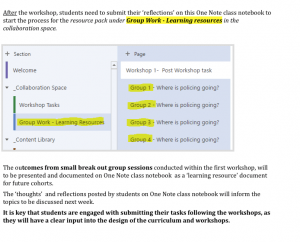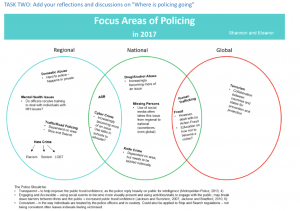By Katie Strudwick – Lecturer – School of Social and Political Science – Staff Profile
When embarking on the journey of developing new modules in curricula design, as co-ordinators we often face a number of pedagogical questions or ‘dilemmas’. This is my journey as coordinator of a level three optional module Police Studies (within the School of Social and Political Sciences, COSS) discussing how integrating OneNote helped to understand of the benefits of interactive learning tools.
Why was it important to get the students ‘on board’ with using OneNote for this new module?
I knew I needed to ensure that the students felt they were part of the design and development. The overriding ethos, or academic rationale, for this collaborative module was to embrace and enhance co- learning, partnerships and show that learning can be disseminated from good practice. Thus a mix of academic theory and practice has dividends for students’ development and skills. This module was developed in collaboration with Lincolnshire Police and focused on providing joint teaching in workshops from practitioners.
What was the pedagogical challenge and benefits?
The pedagogical challenges I faced were to get the students engaged and ‘committed’ in the partnership and joint ethos for this module. They needed to be engaged and want to take some ownership over the developments of the module, both for helping future cohorts, but also on an external enterprise level, by engaging in a professional manner with the practitioners each week. I knew that the module would face some unexpected issues that often occur with guest speakers in timetabled teaching sessions. Overcoming such hurdles happened as a result of commitment and extended planning and preparation meetings, enabling the commitment of senior-level practitioners for nine, two hour workshops each week. In addition to this, collaboratively deciding on themes, the topics and asking them to design and deliver the sessions with interactive groups tasks was a ‘big ask’!
The evidential benefits of this module were about this being student-centered, through student, academic and professional engagement and participation. This was all developed by a Student as Producer ethos, within the framework of partnerships, collaboration and sharing of knowledge. The benefits for both the University (students and myself as an academic) and practitioners were obviously mutual and collective. Practitioners were offered the experience of teaching in Higher Education, to pass on their knowledge learnt through experience, while students, who often chose this optional module as they were already volunteering as a Special Constable or had an interest in pursuing a policing career, were able to learn about experiences and how contemporary policing topics can be analysed theoretically and conceptually through their assessments.
The academic rationale for adopting innovative teaching and learning approaches were utilised through the use of OneNote. Students were required to submit ‘post workshop tasks’, such as presenting group and individual informal hand ins, they were given access to individualised feedback and communication with the tutor on assessment proposals and expected to participate in the evolving collection of student reading lists. All of these differential opportunities aimed to stimulate discussion and did, in reality, require student engagement and commitment. By offering this new digital learning space to all students enrolled on the module, it became a ‘community’ to critically reflect on what they have learnt in the workshops, enabling peer reflection and transforming students to be the producers of knowledge and active partners.
Applying as a learning support mechanism
Applying OneNote as a supplementary learning support mechanism alongside blackboard offered the students some differential forms of expression and engagement. For students it aided the ability to engage in interactive reflection on practitioner workshops. For the tutor, it enabled in-depth feedback to be designed as a two way process, and presented more visual opportunities to understand the extent of student learning through the ‘Individual reflective policing portfolios’ submitted following each workshop.
Students were able to participate outside of the workshops by using OneNote. Their submission of group reflections on the question where is policing going? were posted alongside a conceptual poster the following week, which began the collection of learning resources. Opportunities to be part of a ‘discussion community’, which reflected on academic research and current policy reforms and trends, were to remain on One Note as resource packs for the next cohort. Therefore, students played a core part in designing and developing an evolving curriculum for Police Studies, through identifying the focus for the next workshop and being part of the community by adding to the resource pack for the future.
What did I learn from this experience?
Although students engaged with submitting post workshop reflections, some delayed their submissions to fortnightly or monthly posts rather than weekly. This may have been because they were not part of the marked assessment, but it did result in some students making up the ‘learning community’ with others ‘dipping in and out’. Communication and feedback between tutor and students was also inconsistent and often patchy, with blackboard and email clearly being seen as the first stop for information, not OneNote. These limitations may simply be a result of the unfamiliarity of this learning aid and might develop better this year, but once the students realise the potential offered through OneNote, with its possibility for greater peer reflection they would be able to see its potential. This year more effort will be made to embed OneNote earlier in the workshops and encourage students to engage with this collaborative space.
The use of OneNote within this collaborative module embedded student engagement within and outside of the curriculum. The objective was to provide a student-led interactive module, providing partnership learning between practitioners and academics. The module was successful with a 100% pass rate and presented a unique opportunity to showcase their work at a policing conference held at Police Headquarters. Participation at this event built transferable skills and enhanced employability, which held plentiful benefits for the students, the University and Lincolnshire Police.

